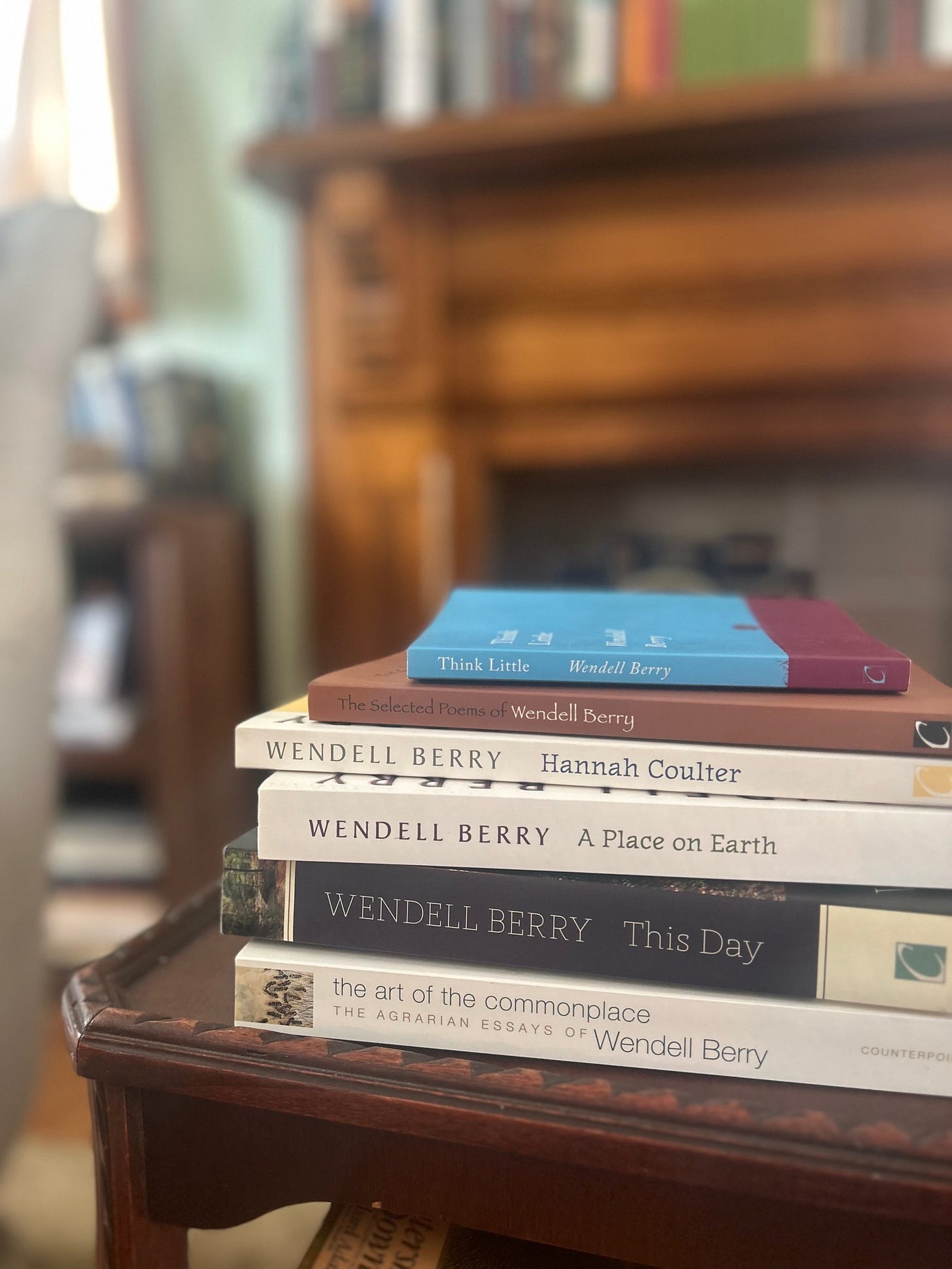May 2025 read-along pick: Jayber Crow by Wendell Berry
Because Wendell Berry is a feast; and I am in need of some nourishment
If there is a writer that both unsettles and comforts me at just the right sort of pace it is none other than the grumpy, gently defiant Wendell Berry.
He is the sort of writer that knows how to both challenge and reassure his readers within a single sentence and I am never left without a feast to think on. I leave his work encouraged; and I leave his work guilty.
“Be joyful though you have considered all the facts.”
-Wendell Berry, “Manifesto: The Mad Farmer Liberation Front”
As an environmental activist, cultural critic, and farmer, there is much that Berry contends with. If you have yet to dive into his works, you will encounter a wealth of questions—and if you aren’t already questioning where your food comes from, you will. (But in spite of my love for Wendell Berry I’m not raising chickens in my backyard or building a bunker so take that for what it is.)
Wendell Berry’s meditative essays offer us alternative ways to think, and the precision in his poetry is downright convicting—but it is through his beloved novels, short stories, and the fictional town of Port William where we see his potent truths take the tangible, practical form of flesh and bone.
A Place on Earth re-shaped my concept of community. Hannah Coulter continues to influence my perception of time. And Remembering had me weeping for things I didn’t know I had lost.
If you have yet to read a Port William novel, know that you can start anywhere. I actually began my Port William journey with Hannah Coulter, which is the last novel to be published in the interwoven series.
You do not need to read one Wendell Berry novel to understand another; you simply need to know that the cast of characters all intersect at one point or another.
It is of my humble opinion, however, that A Place on Earth provides the reader with the most widespread overview of the cast of characters you will encounter in the ever-changing landscape of Port William: The town barber (Jayber Crow), the gravedigger (Uncle Stanley), the Feltner family farm, and many other people and places are uniquely intertwined in this particular World War II era story of a community striving to look out for one another in times of uncertainty.
The fictional town is based on Berry’s own homeland in rural, northern Kentucky along the banks of the Ohio River. And I think it is this precise location (paired with his poetic prose) that makes his writing—and his novels in particular—feel like home to me; although I live more than an hour from the Ohio River (in the opposite direction) it still feels like he is telling the stories of my grandfather and my great and my great-great grandfathers working the land, watching it change with the passing of each season and revolution in farming equipment.
For me, there is something about a Port William novel that recalls trips with my grandma to the local Amish community for fresh eggs and homemade bread—bread I can still taste, stuck to the roof of my mouth, if I think hard enough. And the smell of my grandpa’s modest, gray barn after it had been stocked with hay. (Though there were little more than 20 cows grazing in my grandpa’s wooded land at a time, I can’t help but wonder if they helped to remind him of the days and ways of living in which he grew up.)
Jayber Crow is the next novel in my Port William journey. It tells the story of the town barber’s loss and love and much in-between and I am anticipating some rather rich context. I’ve purchased a physical copy of the novel from my local bookshop, but I plan to follow along with an audio version as well. Either option will do if you choose to read along!
In the meantime, if you have a favorite Wendell Berry essay, poem, short story, or novel, I’d love to know what it is and read about your Wendell Berry experience—because reading Wendell Berry is a heart, soul, and full-body experience.
When I was a young man
grown up at last, how large
I seemed to myself! I was a tree,
tall already, and what I had not
yet reached, I would yet grow
to reach. Now, thirty more years
added on, I have reached much
I did not expect, in a direction
unexpected. I am growing downward,
smaller, one among the grasses.
- Wendell Berry, “Thirty More Years”






Hannah Coulter is the only piece of Berry writing I’ve read but I remember wanting to simply sit with a lot of the sentences he wrote. That book made me long to be at home and in place in a very real way..